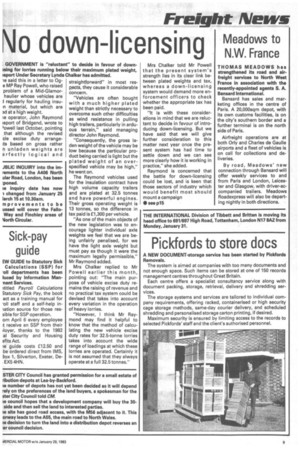No down-licensing
Page 11

If you've noticed an error in this article please click here to report it so we can fix it.
GOVERNMENT is "reluctant" to decide in favour of downming for lorries running below their maximum plated weight, 'sport Under Secretary Lynda Chalker has admitted.
le said this in a letter to Oge MP Ray Powell, who raised problem of a Mid-Glamorhaulier whose vehicles are I regularly for hauling insu4 material, but which are ad at a high weight.
le operator, John Raymond 'sport of Bridgend, wrote to 'owell last October, pointing that although the revised cle excise duty arrangeIs based on gross rather n unladen weights are erfectly logical and straightforward" in most respects, they cause it considerable concern "Vehicles are often bought with a much higher plated weight than strictly necessary to overcome such other difficulties as wind resistance in pulling high trailers, particularly in arduous terrain," said managing director John Raymond.
"Consequently, the gross laden weight of the vehicle may be low because the particular product being carried is light but the plated weight of an overspecified vehicle may be high," he went on.
The Raymond vehicles used for the insulation contract have high volume capacity trailers and are plated at 32.5 tonnes and have powerful engines. Their gross operating weight is 13 tonnes, so the difference in tax paid is £1,300 per vehicle.
"As one of the main objects of the new legislation was to encourage lighter individual axle weights we feel that we are being unfairly penalised, for we have the light axle weight but must pay as though it were the maximum legally permissible," Mr Raymond added.
Mrs Chalker replied to Mr Powell earlier this month, pointing out: "The main purpose of vehicle excise duty remains the raising of revenue and no practical tax system could be devised that takes into account every variation in the operation of heavy lorries.
"However, I think Mr Raymond may find it helpful to know that the method of calculating the new vehicle excise duty rates for 32.5-tonne lorries takes into account the wide range of loadings at which these lorries are operated. Certainly it is not assumed that they always operate at a full 32.5 tonnes." Mrs Chalker told Mr Powell that the present system's strength lies in its clear link between plated weights and tax, whereas a down-licensing system would demand more enforcement officers to check whether the appropriate tax has been paid.
"It is with these considerations in mind that we are reluctant to decide in favour of introducing down-licensing. But we have said that we will give further consideration to this matter next year once the present system has had time to settle down and we can see more clearly how it is working in practice," she added.
Raymond is concerned that the battle for down-licensing could be lost, and is keen that those sectors of industry which would benefit most should mount a campaign • see p15




















































































